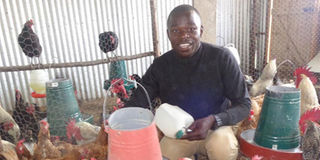Graduates take up agribusiness to create employment

Antony Mudong'i attends to his poultry farm in Kitengela, Kajiado County. He had great hope in getting employment even before completion of his studies. PHOTO | LEOPOLD OBI
What you need to know:
- Mwangi, who is also an ardent youth and women empowerment advocate, feels that the government ought to do more to help market farmers’ produce.
- Many youthful graduates have in effect resorted to agribusiness from which they are making a livelihood, earning even more than they could from employment.
For 25-year-old Antonio Mudong’i, working for a big parastatal such as Kenya Agricultural Research Institute (Kari) or Kenya Seed Company was his dream when he was studying Agribusiness Economics and Food Industrial Management at Jomo Kenyatta University of Agriculture and Technology.
He had great hope in getting employment even before completion of his studies, as many of the people he interacted with told him the course was marketable.
He had declined to study medicine which his parents preferred.
His hope, however, was dashed after interning at the Export Processing Zone in Athi River, where he had received promises of employment on completion of his studies.
According to him, he was very good at work and his star seemed to be rising progressively.
However, certain forces seemed to be working against his progress in the firm.
“They told me to acquire and present all the necessary documentation, which I did and even found a place to stay in Kitengela to be closer to my anticipated workplace. I am still waiting for their call,” he adds with a hint of sarcasm in his voice.
Mudong’i is one of the thousands of youths who after completing their college or university studies embark on the seemingly endless search for employment.
He feels not much is being done to address the country’s issue of youth unemployment.
Frustration and demands from those concerned have made it difficult to get any form of employment in government offices, according to him, citing an instance in which he was asked for Sh300,000 to be employed in a government parastatal in Nairobi.
“I didn’t have the money then and still wouldn’t have given it if I had it,” says the youngster from Kitale, who has seen his star now rise after turning to agriculture and agribusiness.
DIFFICULT TASK
After trying a hand in consultancy while still at university, he now runs Neo-tech Kenya Agribusiness, his own agricultural consultancy company, while also selling fresh farm produce in large-scale, grown in their Kitale farm and poultry from his vast project in Kitengela.
He has himself created employment, directly and indirectly employing at least 40 people in his different projects.
Wainaina Ndereba Mwangi, however, has a somewhat differing opinion.
He feels the government is doing its bit in creating youth employment albeit to those who have the necessary experience.
But he has not had a job since he left college in 2011 forcing him to go into agriculture as well.
The huge demand for poultry products and agribusiness services, and the need for self-sufficiency, is what inspired him into self-employment in agriculture, as formal employment opportunities seemed unforthcoming then.
Mwangi studied Business Management at Makerere University.
While in college, his dream was to work as an auditor in the major audit firms like KPMG, Deloitte or PriceWaterhouseCoopers, among others.
When this did not materialise he tried to go into business journalism but did not even receive a reply from a leading media house when he applied for a position.
“It is currently difficult and exasperating for youth to acquire employment,” he says.
“But I can’t deny that the government is striving to ensure its youth are getting employed even if the employment doesn’t pay that much,” he adds mentioning that he has two youths currently working as his employees.
BRIGHT FUTURE
Mwangi, who is also an ardent youth and women empowerment advocate, feels that the government ought to do more to help market farmers’ produce by eliminating middlemen, as many youths now consider agribusiness their sole source of income.
Twenty-nine-year-old, David Weru together with his partner George Kiambuthi, 28 currently run a successful drip irrigation kit installation company, Dripsol, which mainly targets smallholder farmers.
The former university-mates at Egerton University, both hail from Limuru and studied Water Engineering, graduating in 2013 with dreams of getting plum jobs in water engineering in the government.
That wasn’t to be as after graduating, they both found themselves working as casual labourers in different drip irrigation installation firms.
“The hustling frustration was tangible then, as we only worked whenever there was enough work.
"When there wasn’t, we looked elsewhere to earn for the day, yet we still had bills to pay,” says David.
With some help from well-wishers and their sheer resilience, they set up their now growing enterprise.
Their company’s reception in the market is promising, going by the installations they have so far worked on in their short duration of existence.
The two also cultivate vegetables and onions for sale in their rural home in Limuru, and plan to cultivate the crops on largescale in Nanyuki.
“I believe the government is trying its best to provide employment for its youth, with the difficulty being the large number of youth entering the job market each year,” he says.
“Youth however have the option of getting into farming, which is equally well-paying.”
Many youthful graduates have in effect resorted to agribusiness from which they are making a livelihood, earning even more than they could from employment.


